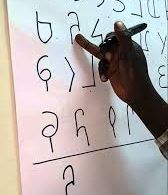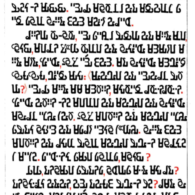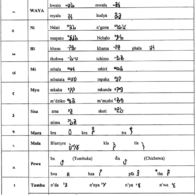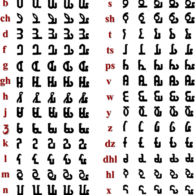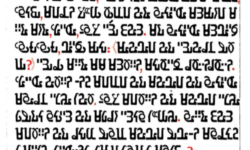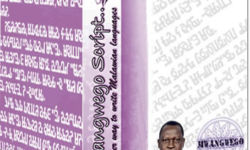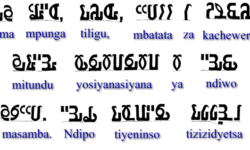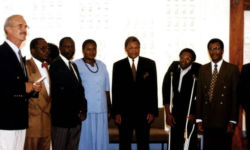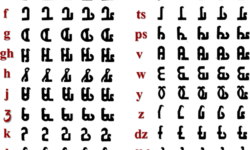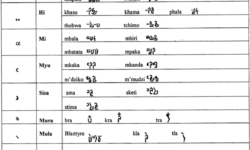Profile
Some scripts are like the pebbles in a stream, worn into their shapes over centuries by the collective action of millions of users.
Others are clearly the work of a single imagination, a single advocate. Such a script is Mwangwego, the product of a lifetime’s labour by Nolence Moses Mwangwego of Malawi.
Born in 1951 in Zambia, then Northern Rhodesia, Mwangwego visited Paris in 1977, where he discovered the existence of other, non-Latin writing systems. He theorised that, as there were words meaning ‘write’ in Malawian languages, there might have been indigenous, pre-colonial scripts. He decided to create a script himself.
“When I was creating this script,” he said, “I was hoping and I wanted it to replace the Latin alphabet when writing Malawian indigenous languages.”
Mwangwego was not without qualifications as a linguist, speaking and writing Chewa, Tumbuka, Kyangonde, English, French and Portuguese.
He started his act of creation in 1979; after innumerable modifications and revisions, he considered the script finished and ready for unveiling twenty-four years later, in 2003.
The magnitude of his endeavour was recognised by the minister of youth, sports and culture, Kamangadazi Chambalo, who announced, “Mwangwego script is in itself history in the making. Irrespective of how it is going to be received by the public nationwide, the script is bound to go in the annals of our history as a remarkable invention.”
It is one level of achievement to create a new, consistent and workable writing system; to get it adopted is an entirely different challenge. After the script was launched, the anticipated government support did not materialize, so Mwangwego began teaching it himself, putting on lectures and exhibitions.
In addition to his desire to create a non-Latin, non-colonial script for Malawi, Mwangwego also hoped that the combination of having a script that was specifically designed for indigenous languages and a script that Malawians could think of as their own would encourage the development of literacy within the country.
“I was hoping,” he wrote by email, “and I still hope, that people in my country will be encouraged to read and write.”
More than 2,000 people have been taught the script, he said, some of whom are now acting as teachers in their turn.
“The script is now being encoded and a computer font is being refined which may mean that Malawians who are proud of their languages will use it in their computers and smartphones.”
—Edited and updated by Eddie Tolmie.
Further update November 2024 from Oreen Yousuf’s Unicode proposal:
“The users of the community are students of the script, some of which are school-aged children. There was an initial community of 200-300 adherents of Mwangwego script in 2001. The number of people who have learned the script since 2001 is between 2,500-3,000. Many are training to be teachers themselves. The script has been continuously learned and taught since 2001 in all 3 regions of Malawi: Northern, Central and Southern Regions. The script has been taught informally since 2001. The distribution of January 2023 cohort of students is broken down as follows: 10 in Karonga, 15 in Mzuzu, 10 in the Malawian capital of Lilongwe, and 5 in Blantyre.
“The script is also included in primers and learning exercise materials for students. As of mid-2024, another cohort of teachers are being trained.
“There has only been 1 full book published in the script, by the creator, as cost is a major obstacle for the majority of past and current learners. There is no government support for the script. There are at least 2 fonts: one made by Andrij Rovenchak, and one by Jana Reddemann and Jenna Leich, the latter of which is used in this proposal. Under consultation with the script creator, the authors have developed a keyboard that applies the character model described in this proposal.”
Note: Tapiwanashe S. Garikayi has created a delightful specimen font for Mwangwego and other indigenous African scripts.
You can help support our research, education and advocacy work. Please consider making a donation today.
Links
General Script, Language, and Culture Resources
- Omniglot
- Wikipedia
- Unicode (PDF)
- Learn Mwangwego Script Part 1
- Learn Mwangwego Script Part 2
- Learn Mwangwego Script Part 3
- Learn Mwangwego Script Part 4
- Scriptsource
- Mwangwego Script: A Legacy That Never Was
